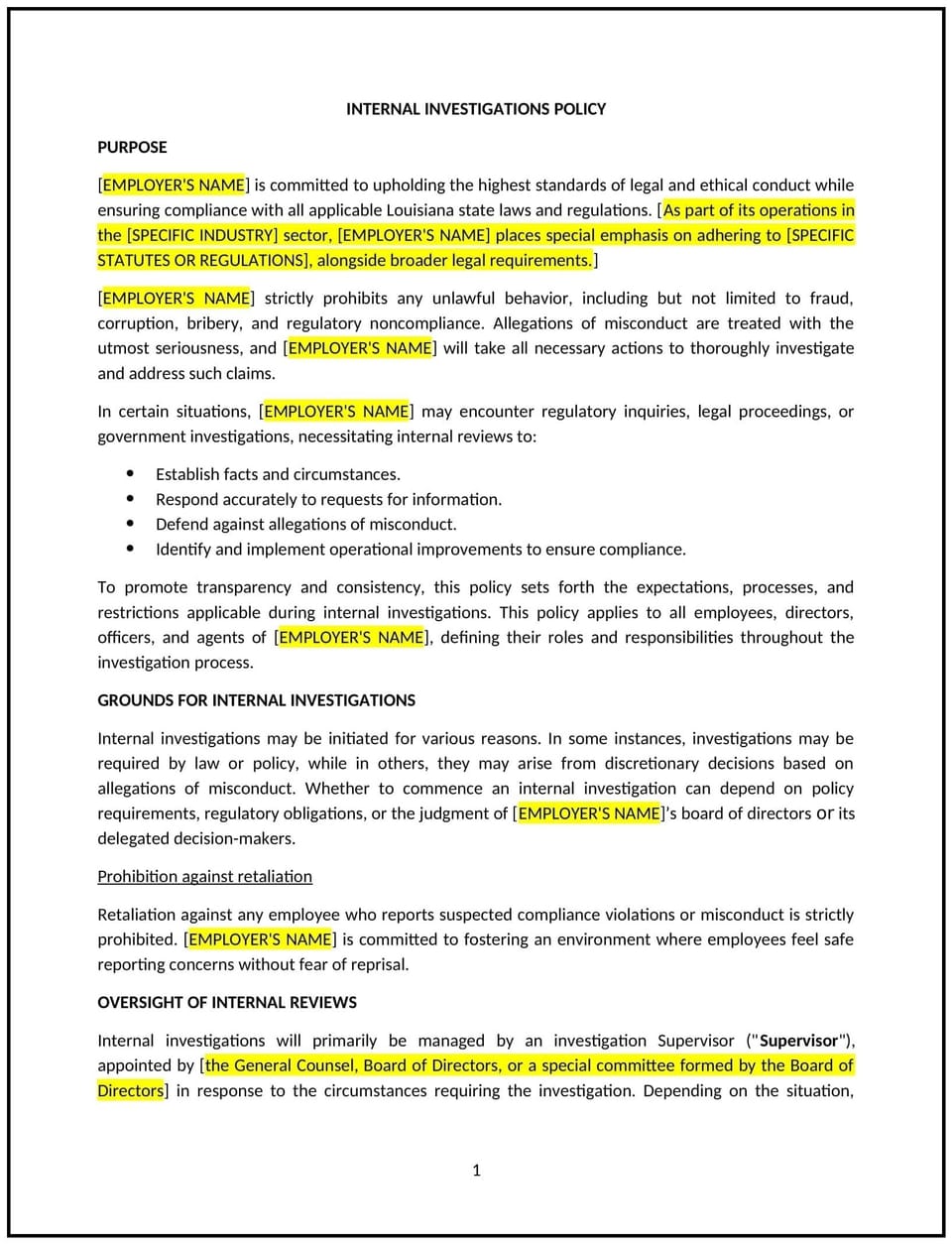Internal investigations policy (Louisiana): Free template

Internal investigations policy (Louisiana)
This internal investigations policy is designed to help Louisiana businesses establish a structured framework for investigating workplace issues such as misconduct, harassment, or policy violations. It outlines procedures for initiating, conducting, and concluding investigations while maintaining fairness and confidentiality.
By implementing this policy, businesses can address concerns effectively, protect employee rights, and promote a culture of accountability.
How to use this internal investigations policy (Louisiana)
- Define scope: Specify the types of issues covered, such as harassment, discrimination, theft, or safety violations.
- Establish roles: Identify who is responsible for conducting investigations, such as HR personnel, managers, or external consultants.
- Outline reporting procedures: Provide clear steps for employees to report concerns, including confidential reporting channels.
- Detail investigation steps: Include procedures for gathering evidence, interviewing involved parties, and documenting findings.
- Emphasize confidentiality: Ensure that all information related to the investigation is kept confidential and shared only on a need-to-know basis.
- Communicate resolution processes: Explain how findings will be reviewed, outcomes determined, and any corrective actions implemented.
Benefits of using an internal investigations policy (Louisiana)
Implementing this policy provides several advantages for Louisiana businesses:
- Promotes accountability: Encourages a fair and thorough approach to addressing workplace issues.
- Reduces risks: Helps prevent escalation of disputes or legal consequences by addressing concerns promptly.
- Clarifies expectations: Provides employees with clear guidelines for reporting and participating in investigations.
- Protects confidentiality: Safeguards sensitive information to maintain trust and prevent retaliation.
- Reflects Louisiana-specific practices: Adapts to local workplace norms and business dynamics.
Tips for using this internal investigations policy (Louisiana)
- Train investigators: Provide training on conducting unbiased investigations and handling sensitive information.
- Use impartial processes: Ensure investigators are neutral and free from conflicts of interest.
- Document thoroughly: Maintain detailed records of the investigation process, findings, and actions taken.
- Communicate clearly: Keep all involved parties informed about the investigation's progress and resolution while respecting confidentiality.
- Review regularly: Update the policy to reflect changes in workplace practices or Louisiana-specific requirements.
Q: What types of issues are covered under this policy?
A: The policy covers issues such as workplace misconduct, harassment, discrimination, theft, safety violations, and other policy breaches.
Q: Who is responsible for conducting internal investigations?
A: Investigations are typically conducted by HR professionals, managers, or external consultants trained in investigative procedures.
Q: How can employees report concerns?
A: Employees can report concerns through confidential channels, such as dedicated hotlines, email addresses, or in-person communication with HR or management.
Q: What steps are involved in an internal investigation?
A: Steps include receiving the complaint, gathering evidence, interviewing involved parties, documenting findings, and determining appropriate actions.
Q: How is confidentiality maintained during an investigation?
A: Confidentiality is maintained by limiting information access to authorized individuals and ensuring sensitive details are securely handled.
Q: How often should this policy be reviewed?
A: The policy should be reviewed annually or when workplace practices or Louisiana laws affecting investigations change.
Q: What actions can businesses take if policy violations are confirmed?
A: Businesses may implement corrective actions such as employee training, disciplinary measures, or changes to workplace practices, depending on the severity of the violation.
This article contains general legal information and does not contain legal advice. Cobrief is not a law firm or a substitute for an attorney or law firm. The law is complex and changes often. For legal advice, please ask a lawyer.


